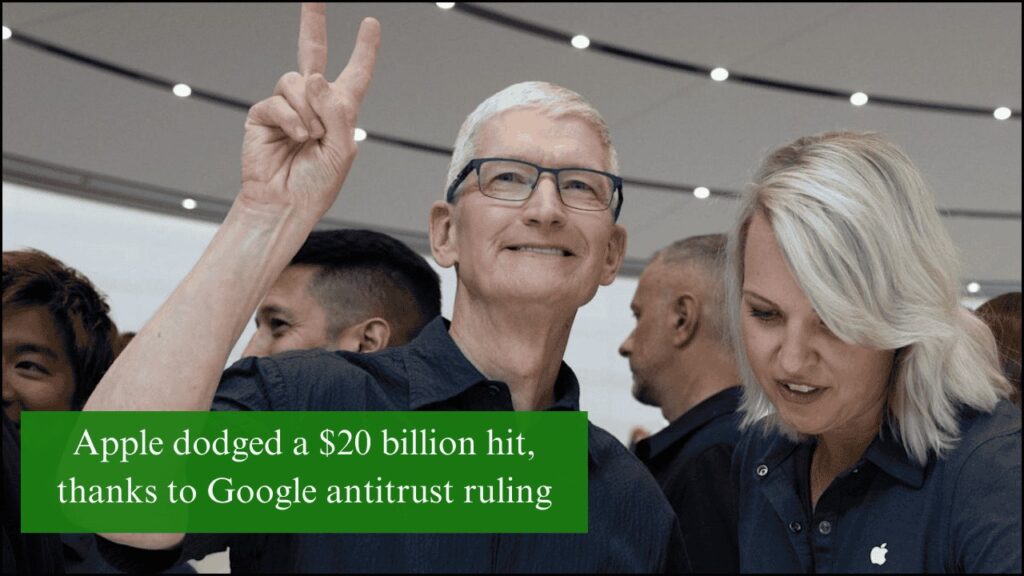
Apple secured a significant financial lifeline this week after a federal court ruled in favor of Google, allowing the search giant to continue making massive revenue-sharing payments to its partners.
The decision, delivered by District of Columbia Judge Amit Mehta, ensures that Google can keep paying Apple billions each year for keeping Google Search as the default option across Safari, Siri, and Apple’s other services.
This ruling effectively saves Apple from losing an estimated $20 billion annually, money that contributes heavily to its Services division and strengthens its broader business model.
Table of Contents
Apple’s Legal Boost
Google’s payments to Apple have long been a subject of scrutiny under U.S. antitrust investigations. Critics argue that such deals unfairly entrench Google’s dominance in the search market. If the judge had ruled against Google, Apple risked losing one of its most lucrative income streams.
Instead, Apple can breathe easier knowing the current partnership will remain intact, though with some new conditions. Importantly, Google can only sign one-year contracts going forward. This means Apple will get more frequent opportunities to renegotiate the terms and potentially secure better financial outcomes.
Overview
| Feature | Details |
|---|---|
| Annual Value | ~$20 billion (2022 estimate, likely higher now) |
| Beneficiary | Apple’s Services division (20%+ revenue contribution) |
| Judge | Amit Mehta, District of Columbia |
| Key Ruling | Google may continue payments but limited to 1-year deals |
| Restrictions | No exclusivity; Apple free to allow AI competitors |
| Apple Stock Impact | Rose 2.5% to ~$236 post-ruling |
| Analyst Outlook | Generally positive; higher targets set ($250–$260) |
Impact on Apple’s Stock
News of the ruling boosted Apple’s stock by over 2.5% on Wednesday morning, pushing shares to approximately $236. The rally underscores how critical this agreement is to investor confidence.
Apple’s Services business, which includes App Store revenue, iCloud subscriptions, and digital advertising, generated $96.2 billion in 2024. The Google deal alone represents about 20.8% of that figure — a staggering contribution that highlights its strategic importance.
Terms and Conditions of the Ruling
While the ruling keeps Google’s payments flowing, Judge Mehta imposed restrictions to prevent anti-competitive behavior.
- Contract Duration – Agreements will now be limited to one year.
- No Exclusivity Requirements – Google cannot force Apple to exclude competing apps or services.
- AI Competitors Allowed – Apple already integrates alternatives such as ChatGPT through Apple Intelligence, which helps counter monopoly concerns.
These provisions mean Apple has more leverage, both financially and strategically, when negotiating future deals.
Google’s Next Steps
Although the ruling favors Google for now, the company has confirmed it plans to appeal the initial antitrust decision that labeled it an illegal monopolist. The appeals process could drag on, but regardless of the outcome, Apple has secured short-term stability.
Analysts’ Take
Industry analysts are largely optimistic about Apple’s position after the ruling.
- BofA Global Research (Wamsi Mohan): Called the decision a “win” for Apple and increased its price target from $250 to $260. He emphasized that there’s no immediate threat to the existing Apple-Google arrangement.
- Morgan Stanley (Erik Woodring): Suggested the ruling could strengthen Apple’s hand long-term. With annual renegotiations, Apple might extract higher payments and even open the door for AI-powered search engines to become new revenue partners.
- TD Cowen (Krish Sankar): Argued that Apple could use its $20 billion deal as a benchmark in negotiations with other generative AI providers.
Shifting User Habits and the Rise of AI Search
During Google’s antitrust trial, Apple’s Senior VP of Services Eddy Cue revealed a notable shift: Safari searches declined in April 2025 as users gravitated toward AI-driven search engines. Cue noted that Apple is actively evaluating AI-based search platforms such as Perplexity to integrate into its ecosystem.
This shift signals that while Google’s payments are essential today, Apple is preparing for a more competitive and AI-centric future in search.
Broader Implications
The outcome of this case carries significance beyond Apple and Google. It sets a precedent for how Big Tech partnerships may be scrutinized under antitrust law, especially when large sums and market dominance are involved.
For Apple, the ability to renegotiate annually not only preserves its cash flow but could also enhance its bargaining power in a rapidly changing AI search market. For Google, continuing the payments helps maintain search dominance, but the looming risk of regulatory restrictions remains.
Ultimately, Apple has avoided a multi-billion-dollar setback while positioning itself to adapt to future industry shifts.





